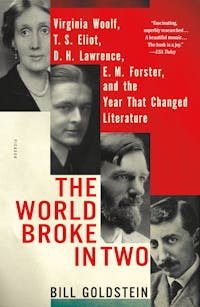The World Broke in Two
Virginia Woolf, T. S. Eliot, D. H. Lawrence, E. M. Forster, and the Year That Changed Literature
 Download image
Download image
ISBN10: 1250182506
ISBN13: 9781250182500
Trade Paperback
368 Pages
$18.99
CA$25.99
The World Broke in Two tells the fascinating story of the intellectual and personal journeys four legendary writers, Virginia Woolf, T. S. Eliot, E. M. Forster, and D. H. Lawrence, make over the course of one pivotal year. As 1922 begins, all four are literally at a loss for words, confronting an uncertain creative future despite success in the past. The literary ground is shifting, as Ulysses is published in February and Proust’s In Search of Lost Time begins to be published in England in the autumn. Yet, dismal as their prospects seemed in January, by the end of the year Woolf has started Mrs. Dalloway, Forster has, for the first time in nearly a decade, returned to work on the novel that will become A Passage to India, Lawrence has written Kangaroo, his unjustly neglected and most autobiographical novel, and Eliot has finished—and published to acclaim—“The Waste Land."
As Willa Cather put it, “The world broke in two in 1922 or thereabouts,” and what these writers were struggling with that year was in fact the invention of modernism. Based on original research, Bill Goldstein's The World Broke in Two captures both the literary breakthroughs and the intense personal dramas of these beloved writers as they strive for greatness.
Reviews
Praise for The World Broke in Two
“Goldstein offers a snapshot history of [the writers'] careers in deference to the American now, embracing not only the chatty familiarity of first names but also, and more significant, the biographical details of authorship that most 21st-century interest in literature seems to depend upon.”—The New York Times Book Review
“This is Goldstein’s own personal triumph: he creates an original, moving and at times wryly amusing account of four literary demi-gods during the course of these few months that shaped a new direction in English literature, incorporating a wealth of detail which builds, layer upon layer, until the picture is satisfyingly complete.”—The Times Literary Supplement
“The ingenious conceit of Goldstein’s book is to follow, using excerpts from both their correspondence and their diaries, the intertwined personal and literary lives of four writers—Virginia Woolf, D. H. Lawrence, E. M. Forster, and Eliot himself—as the three seismic shocks of those publications ripple through their lives, and their work . . . In letting these four writers speak in their own words—their own witty, gossipy, often waspish words—Goldstein neatly avoids a dutiful chronicling of anything so weighty and abstruse as The Rise of Modernism. Cannily, he sacrifices historical sweep and gravitas for something much more grounded and intimate. In his hands, these literary lions prove surprisingly—and bracingly—catty.”—NPR
“An indispensable guide to four legendary writers who were largely responsible for the creation of modern literature.”—The National Book Review
“Goldstein splits his focus between the writers’ work and their intertwined lives, offering drama, cultural insight and a good dose of pure fun.”—The Forward
“The year 1922 was indeed 'a grrrreat littttterary period,' as Ezra Pound wrote to T. S. Eliot, and as Bill Goldstein demonstrates in this stunningly written, riveting day-by-day account of how four of the world's most beloved writers created their greatest works. He provides new insight into the relationships among writers we thought we knew. How heartening this book will be to readers and to writers . . . to realize that even Virginia Woolf, T. S. Eliot, E. M. Forster, and D. H. Lawrence experienced self-doubts, envy, and all kinds of other challenges, and that they simply had to plow through them and get their work done. The World Broke in Two brilliantly illuminates the adventure that is the creative process.”—Sherill Tippins, author of February House and Inside the Dream Palace:The Life and Times of New York's Legendary Chelsea Hotel
“This is a brilliant book about the birth of modernism, one which taught me something on every page. I never knew what a life-changing influence Proust had on Virginia Woolf and E.M. Forster—or how everyone struggled with money, especially T. S. Eliot. This beautifully written book reveals how artistic innovation occurs in the real world of gossip, love affairs, poverty and class differences.”—Edmund White, author of Proust
“[An] accomplished, captivating look at that seminal year through the lens of the interconnecting lives of four literary icons . . . In our own fractured, impatient age, the poignant and arresting stories of these four genius writers evoke nostalgia for a time when precision and introspection were the guiding principles of literature. The World Broke in Two beautifully captures a seismic moment of cultural rupture that, despite its shock and awe, left something new and exciting in its path.”—BookPage
“[Bill Goldstein] makes a solid case for 1922 as the climacteric in which the modern era began—modern, that is to say, in the sense of literary and artistic modernism.”—Kirkus Reviews
“An extensively annotated account of how four major authors invented modernism in 1922 . . . The intimate peek into the lives, rivalries, and heartbreaks of these celebrated writers sustains an entertaining story about how great literature is made.”—Publishers Weekly



